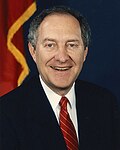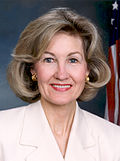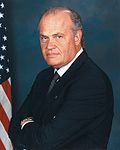The topic of this article may not meet Wikipedia's notability guideline for stand-alone lists .(June 2022) |
The 103rd United States Congress began on January 3, 1993. There were ten new senators (five Democrats, five Republicans) and 108 new representatives (61 Democrats, 47 Republicans), as well as two new delegates (both Democrats), at the start of the first session. Additionally, four senators (one Democrat, three Republicans) and eight representatives (three Democrats, five Republicans) took office on various dates in order to fill vacancies during the 103rd Congress before it ended on January 3, 1995.
Contents
- Senate
- Took office January 3, 1993
- Took office during the 103rd Congress
- House of Representatives
- Took office January 3, 1993 2
- Took office during the 103rd Congress 2
- See also
- Notes
- References
Due to redistricting after the 1990 census, 27 representatives were elected from newly established congressional districts.













